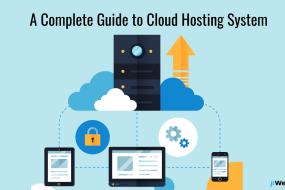
In today’s rapidly evolving digital landscape, businesses are increasingly turning to cloud hosting solutions to meet their diverse hosting needs. Cloud hosting has emerged as a game-changer, offering unparalleled scalability, flexibility, and cost-efficiency compared to traditional hosting methods. In this comprehensive guide, we will explore the fundamental differences between cloud hosting and traditional hosting, shedding light on the unique benefits and cost considerations of cloud hosting. Let’s delve into the world of cloud hosting and discover how it is transforming the hosting industry.
Understanding Cloud Hosting
What is Cloud Hosting?
Cloud hosting is a revolutionary hosting model that utilizes virtualized resources from a vast network of interconnected servers. Unlike traditional hosting, where websites and applications rely on a single physical server, cloud hosting allows for distributed resources across multiple servers. This decentralized approach brings remarkable advantages in terms of scalability, redundancy, and reliability.
How Does Cloud Hosting Work?
Cloud hosting operates on a pay-as-you-go model, where users can access and utilize resources based on their specific needs. The cloud infrastructure ensures that resources are dynamically allocated, scaling up or down to match demand. This elastic nature of cloud hosting enables businesses to handle sudden traffic spikes, ensuring optimal performance and user experience.
Key Differences Between Cloud Hosting and Traditional Hosting
Scalability and Flexibility
In traditional hosting, resource scaling is often a complex and time-consuming process. Businesses need to invest in additional hardware and infrastructure to accommodate growth, which can be both costly and inefficient. In contrast, cloud hosting offers seamless scalability, allowing businesses to scale resources on-demand. With the ability to add or remove resources instantly, cloud hosting provides unparalleled flexibility and agility to meet evolving business requirements.
Cost Considerations
Traditional hosting typically involves upfront investments in hardware, software licenses, and maintenance costs. These fixed expenses can become a burden for businesses, especially startups and small enterprises. On the other hand, cloud hosting operates on a pay-as-you-go model, eliminating the need for significant upfront investments. With cloud hosting, businesses only pay for the resources they use, making it a more cost-effective option, particularly for organizations with fluctuating resource demands.
Reliability and Redundancy
Traditional hosting heavily relies on a single physical server, making it susceptible to hardware failures, power outages, and other unforeseen events. In contrast, cloud hosting ensures high availability by distributing resources across multiple servers and data centers. This redundancy minimizes the risk of service disruptions and provides a robust infrastructure for seamless operations.
Performance and Speed
Cloud hosting leverages advanced caching techniques, content delivery networks (CDNs), and optimized server configurations to deliver exceptional performance and speed. With data centers strategically located worldwide, cloud hosting minimizes latency and enables faster content delivery to end-users. Traditional hosting, while capable of delivering satisfactory performance, may face limitations in terms of scalability and speed compared to cloud hosting.
Frequently Asked Questions (FAQs)
1. What are the cost considerations of cloud hosting?
Cloud hosting costs vary based on resource usage and specific service providers. Factors such as storage, bandwidth, and additional services contribute to the overall cost. It is advisable to assess your resource requirements carefully and choose a pricing plan that aligns with your budget and growth projections.
2. How does Google Cloud hosting pricing compare to other providers?
Google Cloud offers competitive pricing options, and their pay-as-you-go model allows businesses to scale resources as needed. It is recommended to review Google Cloud’s pricing documentation and compare it with other cloud hosting providers to determine the most cost-effective solution for your specific needs.
3. Is cloud hosting suitable for small businesses?
Absolutely! Cloud hosting is an ideal choice for small businesses due to its scalability and cost-effectiveness. Small businesses can start with minimal resources and easily scale up as their needs grow. Additionally, cloud hosting eliminates the need for upfront investments in hardware, making it more accessible for organizations with limited budgets.
4. Can I migrate my existing website to cloud hosting?
Yes, migrating an existing website to cloud hosting is feasible. However, the process may require some technical expertise or assistance from a professional. It is recommended to consult with a cloud hosting provider or a web development expert to ensure a smooth and successful migration.
5. What are some actionable tips for maximizing the benefits of cloud hosting?
- Optimize resource allocation: Regularly assess your resource usage and adjust allocation to optimize performance and cost-efficiency.
- Implement robust security measures: Leverage the security features provided by your cloud hosting provider and follow best practices to protect your data and applications.
- Utilize monitoring and analytics tools: Monitor your cloud resources, track performance metrics, and gain insights to make informed decisions and optimize resource usage.
Conclusion
Cloud hosting has emerged as a powerful alternative to traditional hosting, revolutionizing the way businesses manage their online presence. With its unmatched scalability, flexibility, and cost-efficiency, cloud hosting provides a competitive edge in today’s fast-paced digital landscape. By understanding the key differences between cloud hosting and traditional hosting, businesses can make informed decisions and unlock the full potential of cloud technology. Embrace the future of hosting, embrace cloud hosting.
Advertisement






